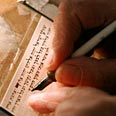
Conservative Jewish leaders moving to end ban on gay rabbis
Committee of Jewish scholars likely to roll back ban on ordaining gay rabbis. 'It is simply not natural to demand that they remain celibate,' one rabbi says, adding that movement has to 'interpret God's will'
A key Conservative Jewish leader is organizing talks nationwide to tell synagogues that the movement will likely roll back its ban on ordaining openly gay rabbis by year's end. He and two religious law experts joining him at the meetings are trying to help congregations prepare for the confusion and discomfort to follow.
Rabbi Jerome Epstein, executive vice president of the United Synagogue of Conservative Judaism in New York City, says a committee of scholars who interpret Jewish law for the movement will likely loosen the prohibition when they vote in December. At the same time, Epstein expects the scholars will endorse a policy aiming to keep more traditional congregations within the fold. Synagogues that believe Jewish law bans same-sex relationships still will be able to hire rabbis who share their view.
The vote by the Committee on Jewish Law and Standards will test what Conservative leaders call their "big umbrella" allowing diverse practices within one movement. It will also signal to the wider community how far the Conservative branch will go to reinterpret Jewish law.
"The committee might accept—will accept, I think—two or more" policies, Epstein said at an August 24 meeting of New York Conservative Jewish leaders. "One that actually reaffirms the current position and at least one that will liberalize it."
'Law stands to cause pain'
The effect of the contradictory actions will be that local Jewish communities have more freedom. Conservative seminaries, along with the movement's estimated 750 synagogues and more than 1,000 North American rabbis, will get to decide which policy to follow.
"It could cause confusion, it could cause tremendous angst, it could cause tremendous tension, it could cause tremendous disagreement," Epstein said.
Rabbi Joel Roth, a leading religious scholar and a member of the Conservative Law Committee, questioned whether people with traditional Jewish views on sexuality will stay, even if the panel allows synagogues leeway to accept or reject gay relationships. Roth said he has been "demonized" for saying that he interprets religious law as barring same-gender sex.
"I know the law as it stands causes pain," he said. "But pain is not to be equated with immorality."
Interpreting God's will
Rabbi Elliot Dorff, vice chairman of the Law Committee and also a respected scholar, supports ordaining gays, saying "it is simply not natural" to demand that they remain celibate.
"We have to interpret God's will in our time," Dorff said.
Dorff and Roth are traveling with Epstein, with more stops scheduled for Atlanta, Philadelphia, Los Angeles, and Washington, D.C. The trio also spoke last month in Toronto.
The debate focuses on the significance of Leviticus 18:22, which states "Do not lie with a male as one lies with a woman," and 20:13, which says such an act is punishable by death. The last major Law Committee vote on gay relationships came in 1992, when the panel decided overwhelmingly to maintain the ban on openly gay rabbis.
Arnold Eisen, incoming chancellor of the Jewish Theological Seminary in New York, the flagship school for Conservative Judaism, personally supports ordaining gays. But he plans to discuss the issue with faculty and students before any admissions rules are changed.
Officials at the University of Judaism in Los Angeles, which also trains Conservative rabbis, say only that they will follow whatever policy the committee adopts. However, Dorff is the school's rector and many expect the seminary, if permitted, will admit openly gay students.










